Chandos and Hyperion: Early 2021 Round-up
By Brian Wilson

 By far the majority of the most interesting recordings in recent times have
come from the independent labels, with the majors like Sony and Warner
axing many of their CDs or bundling them in huge box sets, and charging
more for them as individual downloads than you might expect to pay for new
releases, typically £11-£12, and without a booklet. Bruno Walter’s Columbia
recordings, for example, are now tied up in a 77-CD box (19075923242), with
individual downloads costing at least £11.50 in lossless sound – more from
some dealers. Yet some of these are important, even essential, and I am
working on a review of them cumulatively and individually.
By far the majority of the most interesting recordings in recent times have
come from the independent labels, with the majors like Sony and Warner
axing many of their CDs or bundling them in huge box sets, and charging
more for them as individual downloads than you might expect to pay for new
releases, typically £11-£12, and without a booklet. Bruno Walter’s Columbia
recordings, for example, are now tied up in a 77-CD box (19075923242), with
individual downloads costing at least £11.50 in lossless sound – more from
some dealers. Yet some of these are important, even essential, and I am
working on a review of them cumulatively and individually.
It’s often left to enterprising dealers like Presto to preserve recordings
which the big players have ditched, as in the case of Karajan’s Schoenberg Pelleas und Melisande and Berg’s Lyric Suite (Presto/DG 4231322 –
review). It’s not even possible to download those two performances together
without choosing a 3-hour download set, costing around £21, and without a
booklet.
Among the independents, two British labels stand out for quality of
performance, recording and documentation: Chandos and Hyperion. Both offer
their recent releases on CD (some SACDs from Chandos) in mp3, lossless and
24-bit hi-res downloads, and, from their own websites, at reasonable
prices. Both also offer downloads of other labels; I’ve included a few of
these at the end, and I’m regularly impressed by releases from Signum, Gimell, Hallé,
Collegium, LSO, SDG and King’s (Hyperion) and recordings from the likes of
Naxos, Avie, Coro, CPO, and Alpha (Chandos).
Index:
BOWEN Piano Works -
Nicolas Namoradze_Hyperion
EAST
Music for viols and voices – Fieri Consort; Chelys Consort_BIS
ELMAS
Piano Concertos – Shelley; Tasmanian SO_Hyperion
GRAINGER Complete Edition – Various_Chandos
GUERRERO
Magnificat, Lamentations, etc. – El León de Oro/Phillips_Hyperion
HAYDN
2032 Project: Symphonies Nos. 15, 35 and 45 – Il Giardino Armonico_Alpha
- String Quartets Op.76 – London Haydn Quartet_Hyperion
- Piano Sonatas Vol.9 - Bavouzet_Chandos
 JOSQUIN DESPRES
Motets & Mass movements – Brabant Ensemble_Hyperion
JOSQUIN DESPRES
Motets & Mass movements – Brabant Ensemble_Hyperion
LOCATELLI
Il Labirinto armonico
(Op.3 Concertos) – Gringolts; Finnish Baroque O_BIS
MACHAUT
The Lion of Nobility - Orlando Consort_Hyperion
MATTHEWS (David)
A Vision of the Sea, Symphony No.8, etc. – BBC Phil/Steen_Signum
MEDTNER Songs - Fomina/Karpeyev_Chandos
PURCELL
Tyrannic Love - Ensemble Les Surprises_Alpha (with BLOW, LOCKE, CLARKE,
Daniel PURCELL)
ROMBERG
Violin Concertos – Siranossian; Capriccio Barockorchester _Alpha
SCHOENBERG
Verklärte Nacht
– BBCSO/Gardner_Chandos (with FRIED, KORNGOLD, LEHAR)
SCHUBERT
Winterreise
– Williams/Burnside_Chandos
WEINBERG
String Quartets, Volume 1 - Arcadia Quartet_Chandos
Il Cannone
: Paganini’s Violin
- Francesca Dego_Chandos
 English Music for Strings: BRITTEN, BLISS, BERKELEY – Sinfonia of London/Wilson_Chandos
English Music for Strings: BRITTEN, BLISS, BERKELEY – Sinfonia of London/Wilson_Chandos
French Music for the Theatre
- Estonian National Symphony Orchestra/Järvi_Chandos
Italian Opera Arias
– Linda Richardson_Chandos
Musical Zoo
- Riches/Middleton_Chandos
***
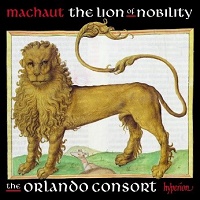 Guillaume de MACHAUT (c.1300-1377)
Guillaume de MACHAUT (c.1300-1377)
The Lion of Nobility
Orlando Consort
rec. St John the Baptist, Loughton, Essex, 26-28 March 2019. DDD.
Texts and translations included
Reviewed as 24/96 download with pdf booklet from
hyperion-records.co.uk.
HYPERION CDA68318
[61:01]
For CD purchase details see
review
by Mark Sealy.
There is always a point when it becomes almost impossible to say anything
new about a distinguished series of recordings. The Orlando Consort’s
recordings of Machaut for Hyperion reached that point some time ago:
- CDA67727 –
review
- CDA68008 –
review
-
CDA68103
review
–
review
- CDA68134 –
review
- CDA68195 –
review
–
review
- CDA68206 –
review
- CDA68277 –
review
Add their recordings of
- Guillaume DUFAY (CDA68236 –
review)
-
Beneath the Northern Star; the Rise of English Polyphony (CDA68132 –
review
–
review)
- Loyset COMPERE (CDA68069 –
review)
and you have a very impressive discography.
I’m surprised to see that I seem not to have set down my thoughts on all of
these. Perhaps I had already run out of things to say that my colleagues
hadn’t said, though I note that GH had more reservations about some of the
later releases than I felt, preferring the Binchois Consort, but that’s
rather like comparing a Mercedes with a Rolls Royce.
Fans of the Binchois Consort should note their forthcoming recording of Music for the King of Scots, due out in April
2021 (CDA68333). The music is anonymous, apart from a setting of Ave Maria by the English composer William Cornysh. The two main
works are a setting of the ‘Catherine Wheel’ Mass and the Magnificat. It’s all taken from the Carver Choirbook, apart from
the Cornysh, which comes from the near-contemporary Eton Choirbook.
My initial response is that the anonymous works are less interesting than
the music of Robert Carver, whose music gives the Choirbook its name, or
the Cornysh Ave Maria, but that the singing of the Binchois
Consort makes the best possible case for it all. I hope to return to this
recording nearer to the time of its release. For Carver’s music, an
excellent starting point is a Coro recording of The Sixteen in his Missa Dum sacrum mysterium (COR16051 –
Spring 2020/2).
I can’t find that I ever obtained the two most recent Machaut
recordings, CDA68206, The Gentle Physician, and 68277, The Single Rose, so I
downloaded them in 24-bit sound - £12.00 each in that format from
hyperion-records.co.uk:
link
to all their recordings. Unsurprisingly, I find myself agreeing much
more with the positive aspects of Gary Higginson’s reviews, especially his
suggestion of starting to explore the series with CDA68277, than with his
reservations.
The newest recording takes its name from the longest work, the lai En demantant et lamentant (Lai 18/24, track 6), a
lament for the ‘Lion of nobility’, thought to refer to King John II of
France, son in law of Machaut’s first patron John of Luxembourg, taken
prisoner at the Battle of Poitiers in 1356. Not only is it the longest
work, it’s also the most complex, and it’s far from clear how it was meant
to be performed. There is evidence that each set of three stanzas was to be
sung together, as is the case with the duplex and triplex texts of
Machaut and other composers of the period: two or more texts sung
simultaneously, often secular words in French and sacred words in Latin, as
in the opening Motet 6, S’il estoit nuls / S’Amours tous / Et gaudebit cor vestrum,
conveying what the notes in the booklet aptly describe as ‘a complex
message’.
That doesn’t quite work for En demantant et lamentant, not least
because it has a continuous narrative, so the consort has chosen to repeat
each section three times, varying the voice for the texts, with the other
voices singing wordlessly. It sounds very complicated, but it works very
well in practice. The effect is almost mesmeric. The only other recording
that I have been able to locate, from Trio Subtilior on Ars Harmonica AH112
(download only) arranges the music for flutes and polishes the work off in
4½ minutes, so no challenge there for the Orlando Consort.
Trio Subtilior also give us the rondeau Ma fin est mon commencement (Rondeau 14), a more
substantial offering this time, but the instrumental-only performance of
both works means that there’s a sameness about everything on that
recording. Memory suggested a substantial performance for comparison, on
the David Munrow collection The Art of Courtly Love (Erato
2435612845). That’s one of Munrow’s Early Music Consort recordings that
deserve to be in any collection: music by Machaut, Binchois and Dufay, but
whereas it used to be available as a modestly-priced 2-CD set – I see that I
bought it for £5.99; the receipt is still in the case – it’s now
download-only and scandalously over-expensive: £26.99 or more for lossless,
and no booklet.
Unfortunately, the prospect of hearing Munrow’s take on this piece is
illusory: I’d forgotten that he recorded several of the pieces in an
instrumental transcription, in this case for two cornetts and his signature
instrument, the crumhorn. He also recorded Dame, se vous m’estes lonteinne (Ballade 37, track 3 of
the Hyperion album) instrumentally, in this case on the bagpipe, so no
chance of comparison there. That leaves the new Hyperion without peer
- and I doubt if any other group will ever excel this performance.
The booklet is well up to Hyperion’s high standard, but it was something of
a leap of faith to assume that francophone readers didn’t need a
translation of these C14 texts – the language has changed more than
slightly in 700 years. Otherwise, this is an essential purchase for the
admirers of Machaut’s music, and, as Mark Sealy concludes – link above – a
good place for beginners to get to know it.
S’il estoit nuls / S’Amours tous / Et gaudebit cor vestrum
[2:11]
On ne porroit penser
[4:07]
Dame, se vous m’estes lonteinne
[3:04]
Moult sui de bonne heure nee
[4:58]
Ne pensez pas, dame, que je recroie
[2:42]
En demantant et lamentant
[17:52]
Mes Esperis se combat
[6:57]
J’aim sans penser laidure
[2:25]
Ma fin est mon commencement, R14 [6:03]
C’est force, faire le vueil
[4:28]
Je puis trop bien ma dame comparer
[3:43]
Tant doucement m’ont attrait / Eins que ma dame / Ruina
[2:27]
The Orlando Consort: Matthew Venner (countertenor), Mark Dobell (tenor),
Angus Smith (tenor), Donald Greig (baritone).
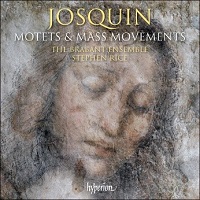

Josquin DESPRES (c.1450/55-1521)
Motets & Mass movements
Mittit ad virginem
[7:55]
Alma redemptoris mater
/ Ave regina cælorum [6:30]
Huc me sydereo
a 6 [8:55]
Stabat mater
a 6 [9:00]
O bone et dulcissime Jesu
a 6 [10:23]
Domine, ne in furore tuo … miserere
[9:22]
Usquequo, Domine, oblivisceris me?
[10:20]
Homo quidam fecit cœnam magnam
[4:05]
Gloria de beata virgine
[8:12]
Sanctus de Passione
[3:46]
David Stuart (bass)
The Brabant Ensemble/Stephen Rice
rec. 16-18 January 2020, St Silas the Martyr, Kentish Town, London. DDD.
Texts and translations included.
Reviewed as 24/96 download with pdf booklet from
hyperion-records.co.uk.
HYPERION CDA68321
[78:36] CD from
Amazon UK
-
Presto
Hot on the heels of the completion of the superb Gimell recordings of the
Josquin Masses – the final volume was my top choice among my Recordings of
the Year for 2020 –
review
–
review
– the Brabant Ensemble come along to remind us that Peter Phillips and the
Tallis Scholars have left plenty of material over. Indeed, though Hyperion
are always modest in claiming first recordings, there aren’t too many
rivals: Mittit ad virginem can be found on a Challenge Classics
recording of the motet and Mass Ave Maris Stella from Cappella
Pratensis and Stratton Bull (CC72632). There are several recordings of the Stabat Mater, including a new release from Cantica Symphonia on
Glossa (GCDP31909) and it’s included in a very fine collection from
Alamire, Anne Boleyn’s Songbook (Obsidian CD715: Recording of the
Month
2015/10), but the Hyperion is unique in adding a si placet part from a
later source.
Not only does the Brabant Ensemble give us splendid performances of all
the music, to convince us that these are far from sweepings from the
workshop floor, Stephen Rice brings us up to date on Josquin research,
including what little is still known about his ancestry and his life. That
includes a more definitive date of birth, some ten to fifteen years after
the ‘c.1440’ that is still listed in some quarters. Without boring the
reader with too much detail, the notes also address the issue of what is
certainly Josquin, probably Josquin, partly Josquin, and not Josquin – as
controversial as some of the attributions of paintings of the period. All
the music here is free from asterisks in the authoritative edition, though
some of it contains additions from later hands.
At the risk of appearing to be fixated on Josquin, I’m already considering
this recording as one of my six choices for Recording of the Year 2021.
As an exception to my comment on the major labels, Decca have just released
a recording of the music of Josquin (4851340). Entitled The Golden
Renaissance, and performed by Stile Antico, the main work is the
Missa Pange lingua.
A first hearing
suggests that it's well worth considering, alongside the Gimell
recording with The Tallis Scholars on a budget-price twofer: The
Tallis Scholars sing Josquin (CDGIM206 -
review).
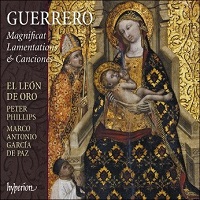 Francisco GUERRERO (1527/8-1599)
Francisco GUERRERO (1527/8-1599)
Magnificat quarti toni
[8:13]
Ave virgo sanctissima
[3:38]
Hei mihi, Domine
[3:48]
Lamentations [9:01]
Beatus Achacius oravit
[7:12]
Sancta et immaculata
[4:04]
Regina cæli
a 8 [4:16]
Laudate Dominum de cælis
[3:23]
Los reyes siguen la ‘strella
* [3:25]
Antes que comáis a Dios
* [2:55]
Sanctissima Maria
* [2:38]
Si tus penas no pruevo
* [3:12]
Mi ofensa ‘s grande
* [4:58]
El León de Oro/Peter Phillips, Marco Antonio García de Paz*
rec. 25-27 October 2019, Iglesia del Real Monasterio de San Salvador de
Cornellana, Salas, Asturias, Spain. DDD.
Texts and translations included
Reviewed as 24/96 download with pdf booklet from
hyperion-records.co.uk.
HYPERION CDA68347
[60:53] Due for release 5 March 2021.
El León de Oro have already impressed with their earlier initial release: Amaræ Morti (Hyperion CDA68279 –
review
–
review
–
Winter 2018-19/2). Formidable as Peter Phillips’ recordings with his own Tallis Scholars
are – their final recording of Josquin was my Recording of the Year for
2020 – his work with these Spanish singers is equally impressive. Not too
long ago, Spanish choirs singing their own music left something to be
desired; this recording offers one of several reasons why that’s no longer
the case. Peter Phillips, as honorary director, has the lion’s share of
this new recording and contributes the notes, with their principal
director, Marco Antonio García de Paz, rounding the programme off with four
excerpts from Guerrero’s Canciones y villanescas espirituales
(Venice, 1589).
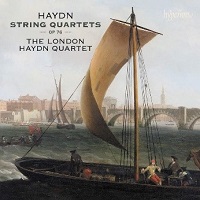 Franz Joseph HAYDN (1732-1809)
Franz Joseph HAYDN (1732-1809)
String Quartets Op.76
(1799)
String Quartet, Op.76/1 in G [24:14]
String Quartet, Op.76/3 in C ‘Emperor’ [32:12]
String Quartet, Op.76/5 in D [20:33]
String Quartet, Op.76/2 in d minor ‘Fifths’ [26:14]
String Quartet, Op.76/4 in B-flat ‘Sunrise’ [24:51]
String Quartet, Op.76/6 in E-flat [25:15]
London Haydn Quartet
rec. March 2020, Potton Hall, Dunwich, Suffolk. DDD.
Reviewed as 24/96 download with pdf booklet from
hyperion-records.co.uk
HYPERION CDA68335
[2 CDs priced as 1: 2:33:30] CD from
Amazon UK
-
Presto
The London Haydn Quartet, having already recorded eight of the composer’s
earlier sets, from Op.9 to Op.74, now reach the apex of his output in a
form of which he can truly claim to be the ‘father’, or, at the very least,
the chief developer. Stuart Sillitoe,
reviewing
the Op.71 and Op.74 ‘Apogee’ Quartets in November 2019, ended by wishing
for the imminent release of Volume 9. Here it is, and it’s very good
indeed.
For absolute completeness, you still need the Kodály Quartet on Naxos, who
include the very early Op.1, Op.2 and Op.3 works in their complete set
(8.502400), also available separately, but, in truth, anything earlier than
Op.9 is of marginal interest – unlike the earliest symphonies, which are
well worth hearing. The Kodály recordings of Op.76 have been my choice from
the earliest days of Naxos CDs (8.550314 and 8.550315), but they are
superseded now by the London Haydn Quartet – priced as 2-for-1, so actually
less expensive than the Naxos.
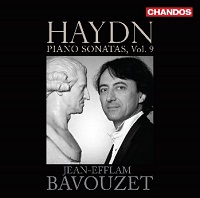 Franz Joseph HAYDN (1732–1809)
Franz Joseph HAYDN (1732–1809)
Piano Sonatas, Volume 9
Sonata No.10 in C (Hob.XVI:1) [8:38]
Sonata No.44 in F (Hob.XVI:29) [16:48]
Sonata No.41 in A (Hob.XVI:26) [11:35]
Sonata No.2 in C (Hob.XVI:7) [4:35]
Sonata No.52 in G (Hob.XVI:39) [16:07]
Sonata No.53 in e minor (Hob.XVI:34) [14:30]
Jean-Efflam Bavouzet (piano)
rec. Potton Hall, Dunwich, Suffolk; 8–10 July 2020
Reviewed as press preview from chandos.net.
CHANDOS CHAN20131
[72:15] Due for release in March 2021.
Haydn’s piano sonatas may be overshadowed by those of Mozart and, even
more, those of Beethoven, but Jean-Efflam Bavouzet continues to make a
strong case for them. Michael Greenhalgh’s very detailed and enthusiastic
review
of Volume 7 – a Recording of the Month – is just as applicable to Volume 9.
I have to admit to having passed these sonatas by in the past, but this
recording made me take notice. My only reservation is that I would have
liked to have heard the music on a fortepiano, but Bavouzet is by no means
heavy-handed on his modern Yamaha grand piano; the recording places him
at just the right distance, and the understated cover fits the music,
performances and recording to perfection.
If you do want to hear this music on the fortepiano, BIS offers a very fine
series from Ronald Brautigam, offered separately or as a bargain set of 15
CDs, target price £35 (BIS-1731/33 – Bargain of the Month
review). The eclassical.com download, at $73.82, is out-priced by the discs; even
worse, it’s also available for $150.21!
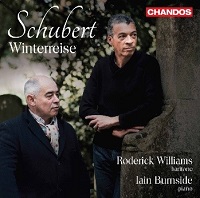 Franz SCHUBERT (1797–1828)
Franz SCHUBERT (1797–1828)
Winterreise, Op.89, D911 (1827–28)
A Cycle of Songs by Wilhelm Müller for voice with piano accompaniment
Roderick Williams (baritone)
Iain Burnside (piano)
rec. Potton Hall, Dunwich, Suffolk; 15–17 July 2020. DDD.
Reviewed as 24/96 press preview from
chandos.net.
CHANDOS CHAN20163
[71:57] CD from
Amazon UK
-
Presto
We were not in urgent need of another Winterreise; this new
recording faces strong competition, with versions to suit all tastes.
There’s even a recording with trombone and piano (Naxos), but I’ll give
that a miss. My long-term benchmark comes from Dietrich Fischer-Dieskau and
Daniel Barenboim (DG Virtuoso 4785186, mid-price CD, ridiculously more
expensive as a download) or F-D with Gerald Moore (best go for the 3-CD set
4777956, with Schöne Müllerin and Schwanengesang while
you are about it, around £16, but, again, more expensive as a download). I
listed those and other very fine recordings in reviewing a Hyperion
recording (CDA68034, Gerald Finley and Julius Drake). I thought that as
good as any of the best; rather than repeat the comparisons, I’ll refer you
to that
review,
to John Quinn’s
Recording of the Month
and to Ralph Moore’s selective 2019
survey. A little later in 2014, I found myself very much attracted to a Harmonia
Mundi recording from Matthias Goerne and Christoph Eschenbach –
2014/15.
There are so many aspects of Winterreise that it’s impossible to
point to one best buy. Some parts are so lyrical that they might almost be
folk songs – in fact, before I became really interested in classical music,
I used to think that Der Lindenbaum was a folk song, because it
and Die Forelle were included in a book of Deutsche Volkslieder to which I learned the accompaniment. When
Schubert played the cycle to his friends, Franz von Schober remarked that Lindenbaum was the only piece that he liked.
From that recollection of childhood happiness to the bleak future
foreshadowed in Der Leiermann, the music takes in a whole gamut of
moods. Overall, the impression must be powerful: Schubert put so much
energy into the music that his friends thought it had shortened his already
fragile life. In Die Schöne Müllerin, we know what sparks the
tragedy, the miller’s daughter’s fickle transfer of her affections to the
huntsman in green. In Winterreise, we only know that the
poet/singer arrives as a stranger (Fremd bin ich eingezogen) and
leaves as a stranger. The mystery serves to heighten the tragedy.
My first impression was that Roderick Williams and Ian Burnside were not
going to match the power of the best recordings, but first impressions can
be misleading, and the power begins to build up as the music progresses. By
the time that we reach the final work, the bleak resignation of the
poet/singer is well caught. The one answer that makes sense to me about the
figure of the old hurdy-gurdy man in Der Leiermann is that he
represents Death, like the old man in Chaucer’s Pardoner’s Tale.
He stands there all the time at the edge of the village, but no-one takes
notice of him, though the children, who have least need to fear him, mock
him. Resignedly, the traveller agrees to go with him. It’s more than a coincidence
that this is the last piece in Schubert’s cycle as we have it: he published
the music in two cycles, the first (February 1827) ending with Einsamkeit, in which he wanders ‘lonely as a cloud’, cut off from
all around him.
If you have to be haunted by this music to sing it, as seems to be the case
with my benchmarks listed above, how do Williams and Burnside compare
overall? I mention both performers, because here, of all Schubert’s Lieder,
the performances stand or fall by the pianist as much as the singer, not
least because he not only has to match his mood to the words, he also has
to emulate the sounds of nature, the post-boy, the hurdy-gurdy.
The music was originally composed with a tenor soloist in mind, but
Schubert approved of it being sung by a baritone, notably by his
friend Johann Michael Vogl. Fischer-Dieskau, in his many recordings, proved
to be a modern Vogl. If I single out his single-CD with Barenboim, that’s
because I got to know that version even better than the Moore recording in
the box set. And it’s to Dieskau that I ultimately turn, for all the appeal
of the more recent recordings. With Dieskau everything seems utterly
inevitable, inevitably bleak. One can almost imagine him disappearing with
the hurdy-gurdy man at the end, after he and Barenboim give that final song
just a little more space to impress the listener.
Paradoxically, the recording with Moore in the 3-CD set, though slightly
faster than the one with Barenboim, is just as convincing. By the end of
both, Dieskau gives us the impression that he’s off with the fairies, like
the characters in the stories analysed by Tolkien in Tree and Leaf. If Williams doesn’t quite achieve that degree of being haunted by the
music, he comes very close, and Burnside’s accompaniment is very closely
matched to the mood – dare I say even more than Gerald Moore at times?
As is often the case with recent Chandos releases, I had to turn up the
volume several notches for the best results. Once that’s done, the
recording is very good. There’s no SACD – only about half of Chandos new
recordings are issued in that format – but the 24-bit sound is good. If you
must have a modern hi-res recording, this Chandos is well worth considering
alongside Finley and Drake on Hyperion.
I realise that I’ve mentioned only baritone recordings among my top
choices. Those seeking a tenor version should consider Bostridge and Adès
(Pentatone PTC5186764: Recommended –
review
–
review), Kaufmann and Deutsch (Sony 88883795652), Güra and Berner (Harmonia Mundi
HMC902066) and Padmore and Lewis (Harmonia Mundi HMU907484:
Recording of the Month
– review).
In closing, let me mention a recent set of recordings from Llŷr Williams
(piano) on Signum, download-only or as Presto special CDRs, now brought
together as A Schubert Journey (SIGCD645, 8 CDs, or download from
hyperion-records.co.uk), which includes Liszt’s transcriptions of Lieder from Die Winterreise.
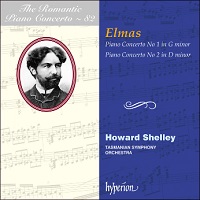 Stéfan ELMAS
(1862-1937)
Stéfan ELMAS
(1862-1937)
Piano Concerto No.1 in g minor (1882) [38:53]
Piano Concerto No.2 in d minor (1887) [34:59]
Howard Shelley (piano)
Tasmanian Symphony Orchestra/Howard Shelley
rec. Federation Concert Hall, Hobart, Tasmania, May 2019. DDD.
Reviewed as 24/96 download with pdf booklet from
hyperion-records.co.uk.
HYPERION CDA68319
[73:55] For CD availability see
review.
This is the Hyperion Record of The Month for January 2021. It’s certainly
another of the very worthwhile discoveries in their Romantic Piano
Concertos series. The historical significance – the first concerto, written
at the age of 20, was the first by an Armenian composer – is only part of
the appeal. The music may not be very original – the influence of Chopin is
especially apparent in No.1 – but Howard Shelley, reprising his role as
soloist and director, has developed a Beecham-like knack of making
second-class music sound much better. Apologies if that sounds like the
exam candidate in an essay which I marked many years ago who asserted that
a fictional character was not as bad as the author had made them appear.
(Not quite as hopeless as another candidate who assured me that the book in
question was boring – and he’d got smashed out at a party the night
before.)
In any case, Elmas makes the Chopin influence – and perhaps that of
Rubinstein in No.2 – into some very attractive, if ultimately unmemorable
music. There’s even some mischievous Mozart ‘borrowing’, but that, too, is
woven into an attractive pair of performances, very well recorded,
especially in the 24-bit download.
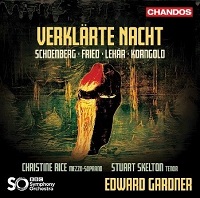 Franz LEHÁR (1870 –1948)
Franz LEHÁR (1870 –1948)
Fieber
(Fever) Tone Poem for Tenor and Large Orchestra: No.5 from Aus eiserner Zeit, Song Cycle for Voice and Piano, orchestrated
1916 by the Composer (1915) [12:29]
Oskar FRIED (1871–1941)
Verklärte Nacht, Op.9 (Transfigured Night) for Mezzo-soprano, Tenor, and Orchestra (1901)
[8:22]
Arnold SCHOENBERG (1874 –1951)
Verklärte Nacht, Op.4 after Richard Dehmel: Arrangement for String Orchestra by the
Composer of Version for Two Violins, Two Violas, and Two Cellos (1899)
(1917, revised 1943) [28:43]
Erich Wolfgang KORNGOLD (1897–1957)
Lieder des Abschieds, Op.14 (Songs of Farewell) for Tenor and Orchestra (1920 –21) [13:36]
Christine Rice (mezzo), Stuart Skelton (tenor)
BBC Symphony Orchestra/Edward Gardner
rec. Phoenix Concert Hall, Fairfield Halls, Croydon; 14 and 15 March 2020.
DDD/DSD
Texts and translations included.
Reviewed as 24/96 press preview from
chandos.net.
CHANDOS CHSA5243 SACD
[63:36] For SACD purchase details see Recording of the Month
review.
This recording puts paid to several penny-in-the-slot assumptions: not all
Lehár’s music is operetta, Schoenberg is not the only composer to have set Verklärte Nacht, and there are not just two versions of the
Schoenberg, for chamber ensemble and string orchestra – he actually revised
it several times.
As for Korngold, Chandos have already given us plenty of reminders recently
that he was not just the composer of film scores, with superb recordings of
his Symphony, etc. (CHSA5220: Recording of the Month –
review
–
review
–
review)
and Violin Concerto and String Sextet (CHAN20135: Recommended –
review
–
review
–
review
–
Spring 2020/2). Those came under the aegis of John Wilson; the new recording is under
the direction of an even longer-established Chandos top conductor, Edward
Gardner. There are several recordings of Korngold’s songs with piano
accompaniment, but not many with orchestra. So, even before hearing a note
of this new release, I was already preparing to praise it.
To the best of my knowledge, there’s only one other recording of the Lehár,
on a CPO album of his more serious music (9994232). Apart from the fact
that he takes the opportunity to include a waltz within the fever-ridden
wounded soldier’s stream of consciousness, you would hardly be likely to
recognise this intense piece as the work of the operetta king if you
encountered it on a dark night. Dark night is indeed the theme running
through this album, not just physically, as the lovers enlighten the dark
night in the two settings of Verklärte Nacht, but also, here and
in the Korngold, the Dark Night of the soul. Full marks to whoever chose
the Munch painting, with its scream of red against the night for the cover
picture.
The Lehár is a work of personal feeling; his brother was recovering in
hospital from wounds received in WWI. It receives a personally felt
performance here, from Stuart Skelton – fresh from his success in Peter Grimes, as the blurb reminds us – and from the BBC Phil and
Edward Downes, also highly praised for his direction of the Britten.
I imagine that most prospective purchasers will mainly be tempted by the
Schoenberg. First, however, comes Oskar Fried’s setting of the actual poem
which the Schoenberg weaves its way around much as Vaughan Williams does
around the Meredith poem in The Lark Ascending and the very simple
Tallis hymn setting in his Tallis Fantasia.
There’s only one other recording of the Fried, coupled with his Die Auswanderer (The Emigrants) and a Fantasia on music from Hänsel und Gretel on Capriccio (C5043). Fried’s admirers will want
that recording, which Michael Cookson thought ‘splendidly played and
recorded with an excellent essay and full texts with English translations
[and proof that] Oskar Fried is certainly a composer of worth.’ (Recording
of the Month). Having checked out that recording as streamed in lossless
sound, I can confirm that Die Auswanderer is indeed a powerfully
affecting work and that the performance of Verklärte Nacht is as
‘lush, tender and dramatic’ as MC says. Between the two more intense works,
the arrangement of Humperdinck’s music makes for a delightful interlude.
The glitch to which MC refers at 14:04 seems to have been limited to his
copy; at any rate, the streamed version sounds OK.
You wouldn’t buy either recording for just the Fried Verklärte Nacht. In any case, if you end up duplicating it, it
amounts only to a small part of the programme of each. Matthias Foremny on
Capriccio allows plenty of time for the music to develop, and his two
soloists sing beautifully. Gardner takes the work at a considerably faster
pace (8:22 against 9:54), so you might expect his performance to be a
little less magical, but there’s little to choose in reality.
Does the availability of the new Chandos on SACD and in 24-bit sound give
it pre-eminence over existing strong recommendations for the main work? Whatever you (or I)
may think of Herbert von Karajan in general, his recording, coupled with
another early Schoenberg work, Pelleas und Melisande, has attained
legendary status (DG Originals 4577212, mid-price CD, more expensive as
download, and no booklet). There’s also a Decca twofer on which Riccardo
Chailly conducts the work in the company of the Gurrelieder
(E4737282), a wonderful bargain, but a closed book to me; if I tell you
that I refer to the Gurrelieder as the Dreary Lieder, you will
know why, though I know that people think it wonderful. At least, I can
stream the Chailly, and the first Chamber Symphony from
Naxos Music Library,
without listening to the Lieder. Gardner is a shade faster than Chailly
or Karajan but, overall, just as effective.
The success of the recent John Wilson recordings of Korngold should not
make us forget that Chandos had already done well by his film music and his
other works, including the Abschiedslieder, recorded by Sir Edward
Downes with Linda Finnie and the BBC Philharmonic (CHAN10431X, with
Symphony, mid-price CD or download). (Be sure to choose the download from
Chandos.net; other suppliers are charging more for the lossless download than for the
CD.)
The farewell in the Korngold Abschiedslieder is the farewell of
death. Chandos seem to have a theme of gloom running through their early
2021 releases: see the review of the new recording of Winterreise
from Roderick Williams and Ian Burnside (above), another work of bleak
beauty confronting hardship and death. And even if Der Leiermann
is one of the bleakest and yet most beautiful pieces of music or poetry
ever written, the opening Lehar almost matches it in intensity and the
closing Korngold comes close to it emotionally in this fine performance.
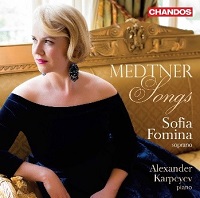 Nikolai MEDTNER (1880–1951)
Nikolai MEDTNER (1880–1951)
Six Poems by A. Pushkin, Op.36 (1918–19) [13:40]
Five Poems by Tyutchev and Fet, Op.37 (1918–20) [13:25]
Four Songs, Op.45, (after poems by Pushkin and Tyutchev) (1922–24) [13:55]
Sieben Lieder, Op.46 (Seven Songs, after poems by Goethe, Eichendorff, and Chamisso)
(1922–24) [15:46]
Sofia Fomina (soprano); Alexander Karpeyev (piano)
rec. Wyastone Concert Hall, Wyastone Leys, Monmouth; 15– 18 March 2018.
DDD.
Texts and translations included
Reviewed as press preview from
chandos.net.
CHANDOS CHAN20171
[57:11]
I’m simply going to say that I enjoyed hearing this. Medtner’s songs are
not my speciality.
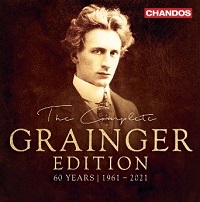 Percy GRAINGER
(1882-1961)
Percy GRAINGER
(1882-1961)
Complete Edition
Academy of St Martin in the Fields Chamber Ensemble
BBC Philharmonic/Richard Hickox, Matthias Bamert
City of London Sinfonia/Richard Hickox
Martyn Hill (tenor)
Della Jones (mezzo)
Joyful Company of Singers
Royal Northern College of Music Wind Orchestra/Timothy Reynish
Penelope Thwaites (piano)
Stephen Varcoe (baritone)
CHANDOS CHAN20196
[21 CDs, no download equivalent] CDs from
Amazon UK
-
Presto
Excerpts on An Introduction to Percy Grainger CHAN2029 [77:14] Budget price CD or mid-price download.
Bargain of the Month –
review.
Compact Disc One
CHAN 9493 Orchestral Works I
Compact Disc Two
CHAN 9584 Orchestral Works II
Compact Disc Three
CHAN 9839 Orchestral Works III
Compact Disc Four
CHAN 9499 Works for Chorus and Orchestra I
Compact Disc Five
CHAN 9554 Works for Chorus and Orchestra II
Compact Disc Six
CHAN 9653 Works for Chorus and Orchestra III
Compact Disc Seven
CHAN 9721 Works for Chorus and Orchestra IV
Compact Disc Eight
CHAN 9987 Works for Unaccompanied Chorus
Compact Disc Nine
CHAN 9549 Works for Wind Orchestra I
Compact Disc Ten
CHAN 9630 Works for Wind Orchestra II
Compact Disc Eleven
CHAN 9746 Works for Chamber Ensemble I
Compact Disc Twelve
CHAN 9819 Works for Chamber Ensemble II
Compact Disc Thirteen
CHAN 9730 Songs for Mezzo-soprano
Compact Disc Fourteen
CHAN 9610 Songs for Tenor
Compact Disc Fifteen
CHAN 9503 Songs for Baritone
Compact Disc Sixteen
CHAN 9702 Works for Piano
Compact Disc Seventeen
CHAN 9895 Works for Solo Piano I
Compact Disc Eighteen
CHAN 9919 Works for Solo Piano II
Compact Disc Nineteen
CHAN 10205 Works for Solo Piano III
Compact Disc Twenty
CHAN 10455 Transcriptions for Wind Orchestra
Compact Disc Twenty-One
CHSA 5121 Works for Large Chorus & Orchestra
This 21-CD set (no download) replaces its 19-CD predecessor (CHAN10638).
Rob Barnett wrote of that ‘Grainger emerges as far more than pretty, cosy
or genteel; more a case of romantic, folksy, dangerous, exultant,
tumultuous and, yes, sentimental. Glorious. A uniquely cornucopiac
offering’. Allowing a degree of poetic licence for the ‘cornucopiac’,
that’s even more true of its successor, which adds the contents of CHAN10455
–
review
– and CHSA5121 –
review
–
review.
There’s no download equivalent, so you’ll have to invest in some extra
shelving, or download the separate volumes; at around £8 each, more from
some dealers, in lossless sound, you’ll soon have spent more than the £62
or so being asked for the CD set.
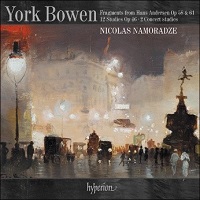 York BOWEN (1884-1961)
York BOWEN (1884-1961)
Fragments from Hans Andersen (1920/21), Op.58 Part I and II, Op.61 Part III
[27:17]
Concert Study for piano No.1 in G flat, Op.9/2 (pub.1917) [4:41]
Concert Study for piano No.2 in F, Op.32 (1920) [3:07]
12 Studies for piano, Op.46 (1919) [31:27]
Nicolas Namoradze (piano)
rec. Concert Hall, Wyastone Estate, Monmouth, 13-15 July 2019. DDD.
Reviewed as 24/96 download with pdf booklet from
hyperion-records.co.uk.
HYPERION
CDA68303
[66:33] For CD purchase and other details see
review
Hyperion and Chandos have both done well by York Bowen, with fine
recordings of his piano music on Hyperion (Stephen Hough, CDA66838 –
review
–
review; Danny Driver, CDA67751/2 –
review)
and Chandos (Joop Celis, CHAN10774, 4 CDs at budget price, or
separately); Symphonies Nos. 1 and 2 (CHAN10670 –
review
–
May 2011/2); Piano Concertos Nos. 3 and 4 (CDA67659: Recording of the Month –
review
–
June 2012/2); Chamber works (CHAN10805 –
review
–
review
–
2014/6); Violin and piano (CDA67991/2 –
review)
and Viola and piano (CDA67651/2: Recording of the Month –
review). His Viola Concerto shares CDA67546 with Cecil Forsyth –
review.
The new recording may not be the most essential of these, but most (all?)
of the music is receiving its first recording, at least in modern times;
Bowen’s many admirers will follow John France’s warm welcome – link above –
and wish to obtain it. I especially enjoyed the ‘English Rachmaninov’ in
lighter mode in the three Hans Anderson-inspired pieces. ‘Thumbelina’ even
dispels memories of Danny Kaye.
If my preference among the January 2021 Hyperion releases goes to the
Machaut and the Elmas recordings, and some of the earlier Bowen recordings
would be preferable to the new album, that’s purely a personal choice, and
no reflection on Nicolas Namoradze’s performances, which is well served by the
24-bit sound and the notes in the booklet.
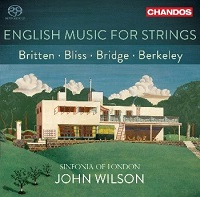

English Music for Strings
Benjamin BRITTEN (1913–1976)
Variations on a Theme of Frank Bridge for String Orchestra, Op.10 (1937)
[23:37]
Frank BRIDGE (1879–1941)
Lament for String Orchestra, H117 (1915) [3:47]
Sir Lennox BERKELEY (1903–1989)
Serenade for Strings in Four Movements, Op.12 (1938–39) [13:01]
Sir Arthur BLISS (1891–1975)
Music for Strings, F123 (1935) [23:56]
Sinfonia of London/John Wilson
rec. Church of S. Augustine, Kilburn, London; 9– 11 January 2020. DDD/DSD
Reviewed as 24/96 download with pdf booklet from
chandos.net.
CHANDOS CHSA5264 SACD
[64:46] SACD from
Amazon UK
-
Presto
A recent LSO Live recording of the Britten comes on an album with
performances of the Elgar Introduction and Allegro and Vaughan
Williams Tallis Fantasia which left both John Quinn and myself
disappointed –
review
–
review. The very names on the cover of this new SACD encouraged higher
expectations; John Wilson and the Sinfonia of London, a name recently
rescued from many years ago, have already made some very fine recordings
for Chandos:
- CHSA5220 KORNGOLD Symphony, etc.: Recording of the Month -
review
-
CHSA5252 Escales – French Orchestral music: Recommended -
review
- CHSA5261 RESPIGHI Pines, Fountains and Festivals of Rome: Recording of
the Month -
review
-
review
- CHAN20135 KORNGOLD Violin Concerto, etc.: Recommended -
review
The old Sinfonia served Sir John Barbirolli well in Elgar’s Introduction and Allegro and Serenade for Strings (Warner
5672402 or 0851872, both download only); can its reincarnation serve this
new recording of English music as well?
With just two exceptions, where Wilson lingers a second longer, he takes the
Britten Variations faster than the composer on his 1966 Decca
recording (Virtuoso 4830392). There’s a strong case for that recording,
though not necessarily because composers are always the best interpreters
of their own music – or poets of their own poetry. It contains the Young Person’s Guide,
without narration, the Simple Symphony, and Four Sea Interludes, and comes at
mid-price. My other benchmark comes from a surprising quarter, a BIS SACD
and hi-res download of Britten’s string music from Camerata Nordica which I
reviewed in
2013/6. I found myself liking the Variations as much as my other
benchmark from Andrew Davis on a budget-price Warner CD (8573890822).
The BIS recording is very lifelike, and the 24/96 download comes with a
surround-sound option at the same price ($17.27). Terje Tønnessen chooses
tempos more in line with Britten’s own than Wilson, and the other works, Lachrymæ, Elegy, Simple Symphony and Two Portraits all receive convincing performances, so it presents
a real challenge to the new Chandos, which, though available on SACD and in
24/96, costs extra (£19.99) for the surround-sound download.
Britten and Tønnessen take 2:41 and 2:57 respectively for the Viennese
Waltz, the latter especially giving the clumsiest dancers time to think out
the next step, though never letting the momentum drop. Wilson makes the
listener sit up and take notice – this is, after all, not music intended
for dancing, despite the title, and, with recording quality just as sharp
as the BIS, both heard in 24/96 stereo. Overall, despite the fast timing
(2:05), this sounds exhilarating rather than rushed. For all my enjoyment
of the Davis/Warner, at 3:06 the waltz really sounds lethargic. Wilson’s
account of the Funeral March, on the other hand, is not at all rushed, but very moving.
For the Britten, then, the choice now is between the BIS and Chandos,
especially for those demanding SACD or hi-res sound. The remainder of the
BIS programme is equally attractive – if you don’t have a recording of Lachrymæ, it’s almost mandatory.
For the Bridge Lament, the competition comes from another Chandos
recording, a 6-CD Hickox legacy set of Bridge’s music, as mandatory for
lovers of the composer as the BIS Lachrymæ for Britten’s admirers.
(CHAN10729(6)X). Dan Morgan called that ‘a box of delights’ –
review
– and Rob Barnett was equally appreciative in a round-up of the whole
Hickox legacy –
review. I reminded readers in
Summer 2019/1
that the individual CDs had disappeared except as CDRs from the Archive
Service.
Sir Lennox Berkeley conducts his own Serenade on Berkeley conducts Berkeley (Lyrita SRCD.226 –
review
–
review). The 1973 sound is no detriment to the enjoyment of these recordings with
the LPO, and the whole programme is essential for Berkeley’s admirers,
containing, as it does, music which has not been over recorded. The only
rival account of Symphony No.3, for example, is on a Chandos collection of
his and his son’s music from Richard Hickox (CHAN10022 –
review). Lyrita have also included Berkeley’s own recording of the symphony in
their excellent budget-price 5-CD set of British Symphonies
(SRCD.2355, as little as £18 on CD, yet costing over £38 as a lossless
download!). That means that you can obtain the symphony on the Lyrita
recording and choose the Serenade on the new Chandos.
In the Serenade, a product of the time spent with Britten at Snape
in the 1930s, Wilson and the Sinfonia turn in performances very similar to
the composer’s own – a perky opening vivace sets the tone on both.
The third movement is allegro molto, and Wilson emphasises the
second word more than the composer does, without seeming to be in undue
haste. In the lento finale, there’s very little to choose between
the two.
It’s another Lyrita recording that provides the comparison for the final
work, Bliss’s Music for Strings (SRCD.254 –
review
–
review). In the first two movements Wilson adopts speeds considerably faster than
Hugo Rignold with the CBSO on that recording. Here, the new Chandos
recording makes the music sound far less dark and austere than the Lyrita,
with a view of the opening allegro moderato, energico more in line
with the English Northern Philharmonia and David Lloyd Jones on Naxos
(8.553383, with Cello Concerto). All three make the finale the stand-out
movement.
Only in the Bliss did I find comparisons with the new Chandos a little
tedious. Here, I definitely favour the new recording; indeed, throughout
it’s all that I expected from the Sinfonia of London and John Wilson.
Though the question of couplings complicates an unambiguous and outright
recommendation, if the programme suits, there are very strong arguments in
favour of Wilson and his team, not least because the recording (SACD and
hi-res) is excellent.
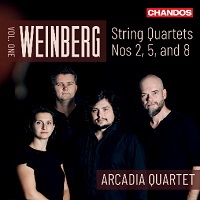 Mieczysław WEINERG (1919–1996)
Mieczysław WEINERG (1919–1996)
String Quartets, Volume 1
String Quartet No.2 in G, Op.3/145 (1939–40, revised 1987) [26:05]
String Quartet No.5 in B-flat, Op.27 (1945) [26:30]
String Quartet No.8 in C, in one movement, Op.66 (1959) [15:29]
Arcadia Quartet
rec. Potton Hall, Dunwich, Suffolk; 4–6 March 2020. DDD.
Reviewed as 24/96 press preview from
chandos.net.
CHANDOS CHAN20158
[68:24] CD from
Amazon UK
-
Presto
Weinberg’s music is often compared in intensity with that of his friend,
influencer and fellow-sufferer from the Soviet authorities, Shostakovich. I
don’t think the Arcadia Quartet have recorded Shostakovich, but their
Chandos recording of Bartók was well liked: Recording of the Month –
review
–
review
– and this recording, billed as Volume 1, has already whetted my appetite
for its successor. Fourteen more Weinberg quartets to go – and then,
possibly, Shostakovich?
Only the Quatuor Danel on their much-liked CPO series perform all three of
these quartets, but differently coupled – see
review
of Nos. 1, 3, 10 and Capriccio by Gary Higginson. Predominantly in
this music a sense of loss and hopelessness alternates with movements of
almost manic celebration, and the Arcadia Quartet are well up to conveying
both moods.
Though not available on SACD – Chandos seem to be issuing fewer and fewer
recordings in that format – the sound of the 24/96 download is very good.
As well as the Chandos notes, of their usual quality, the members of the
quartet have added their own note on the music, which they describe as ‘a
glow of light’. The delight of getting to know music which they hadn’t
previously encountered is apparent from this recording. Roll on the other
volumes.
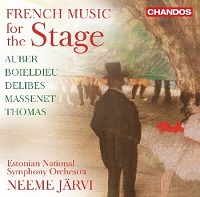 French Music for the Stage
French Music for the Stage
Ambroise THOMAS (1811–1896)
Overture to ‘Raymond, ou Le Secret de la reine’ (1851) [8:03]
Daniel-François-Esprit AUBER (1782–1871)
Overture to ‘Fra Diavolo, ou L’Hôtellerie de Terracine’, S18 (1830) [8:28]
François-Adrien BOIELDIEU (1775–1834)
Overture to ‘Le Calife de Bagdad’ (1800) [7:13]
Overture to ‘La Dame blanche’ (1825) [8:17]
Léo DELIBES (1836–1891)
Scène du bal
and Vieille Chanson from ‘Le Roi s’amuse’ (1882) [17:06]
Jules MASSENET (1842–1912)
Espada
Ballet in one act (1908) [29:09]
Estonian National Symphony Orchestra/Neeme Järvi
rec. Estonia Concert Hall, Tallinn; 30 and 31 May 2018 (Espada), 6
May 2019 (Overtures to Raymond, Fra Diavolo, and Le Calife de Bagdad), and 31 May 2019 (other works). DDD.
Reviewed as 24/48 press preview from chandos.net.
CHANDOS CHAN20151
[78:40] March 2021 release.
This is the sort of music that really needs the Beecham touch. I’m thinking
especially of the music for Le roi s’amuse, which first swam
across my ken as the theme tune for a BBC TV adaptation of Kenilworth many years ago. I presume that they used the Beecham
recording; certainly, that’s the benchmark against which an
otherwise enjoyable version by Ondrej Lenard and the Slovak Radio Symphony
Orchestra falls slightly short (Naxos 8.553270, with Delibes and Adam
ballet suites). The Beecham single CD of French Ballet Music is now
download only, as is the 6¾-hour box set. The most inexpensive way to
obtain his recording of the Delibes in a lossless transfer is the Beulah reissue, with Handel Love in Bath (7PDR4: Reissue of the Month –
review; £7.99 from
Qobuz). Other sites charge the same for inferior mp3. Järvi very nearly makes
the music sound as magic and sparkling as Beecham – but not quite.
For much of the rest of the music, two conductors associated with Decca
would be my first choices: Richard Bonynge (Overtures and Ballet Music of
the 19th Century, two-for-one E4664312, download only, or the 48-CD Bonynge
collection on 4850781) and Jean Martinon (French Opera Overtures, Decca
Eloquence 4762757, download only). As with the Beecham recording of the
Delibes, Järvi comes very close to matching these classics, and does so in
better sound, as heard in 24-bit format.
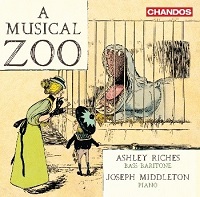 A Musical Zoo
A Musical Zoo
Franz SCHUBERT (1797–1828)
Die Forelle, Op.32, D550 (1817, revised 1820) [2:20]
Die Vögel, Op.172/6, D691 (1820) [1:13]
Robert SCHUMANN (1810-1856)
Die Löwenbraut, Op.31/1 (1840) [8:06]
Hugo WOLF (1860–1903)
Der Rattenfänger
(1888) [2:37]
Johannes BRAHMS (1833–1897)
An die Nachtigall, Op.46/4 (1864–68) [2:58]
Richard STRAUSS (1864–1949)
Die Drossel, WoO34, TrV49 (1877) [2:28]
Gabriel FAURÉ (1845–1924)
Le Papillon et la fleur, Op.1/1 (1861) [2:06]
Maurice RAVEL (1875–1937)
Histoires naturelles
(1906) [16:46]
Modest MUSSORGSKY (1839-1881)
Mephistopheles’s Song of the Flea in Auerbach’s Tavern (1879) [3:18]
Dmitri SHOSTAKOVICH (1906-1975)
Once there lived a cockroach, Op.146/2 (1974) [3:44]
John IRELAND (1879-1962)
The Three Ravens (1920) [4:28]
Herbert HOWELLS (1892-1983)
King David (1919) [5:09]
Samuel BARBER (1910-1981)
The Monk and His Cat, Op.29/8 (1952-53) [2:24]
Vernon DUKE (1903-1969)
Ogden Nash’s Musical Zoo (1947) [12:12]
Benjamin BRITTEN (1913-1976)
The Crocodile (1941) [5:19]
Ashley Riches (bass-baritone); Joseph Middleton (piano)
rec. Potton Hall, Dunwich, Suffolk; 29 June– 1 July 2020. DDD.
Texts and translations included
Reviewed as 24/44.1 press preview from chandos.net.
CHANDOS CHAN20184
[75:13] March 2021 release.
Probably unreasonably, the cover picture encouraged me to expect something
with a little more fun, especially as we have recently had the
Kanneh-Masons in the Carnival of the Animals (Decca 4851166) and
Miriam Margolyes has narrated Babar the Elephant for Nimbus
(NI1571), though I haven’t heard either of those as yet. Perhaps one day
someone will set Albert an’ t’ Lion to music, preferably along with
its less-known sequel in which Albert turns up alive and kicking and his
dad grumbles about having to return the insurance payment of ‘nine pounds
four and two’.
Those illogical considerations apart, I enjoyed this new recording, without
actually getting carried away by it. The highlight is Vernon Duke’s setting
of Ogden Nash; Ashley Riches really gets into the spirit, with the capable
assistance of Joseph Middleton. To the best of my knowledge, this is the
only recording, though Warner recorded the Saint-Saëns Carnival of the Animals with the Ogden Nash verses (9029575952,
with Peter and the Wolf, etc.).
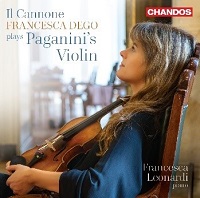 Il Cannone: Paganini’s Violin
Il Cannone: Paganini’s Violin
Nicolò PAGANINI (1782–1840)
La Clochette
(1826)* (‘La Campanella’, arranged c.1905 for Violin and Piano by Fritz Kreisler) [6:35]
Fritz KREISLER (1875-1962)
Recitativo und Scherzo-Caprice, Op.6 (c. 1911) [4:33]
John CORIGLIANO (b.1938)
The Red Violin
Caprices (1997) [8:10]
Carlo BOCCADORO (b.1963)
Come d’autunno
(2019, first recording) [4:31]
Nicolò PAGANINI
Cantabile, Op.7 (1823, piano accompaniment arranged 2019 by Carlo Boccadoro, first recording)* [5:07]
Gioachino ROSSINI (1792–1868)
Un mot à Paganini
(c. 1865?)* [9:06]
Alfred SCHNITTKE (1934-1998)
A Paganini
(1982) [10:42]
Karol SZYMANOWSKI (1882-1937)
Trois Caprices de Paganini, Op.40 (1918)* [14:47]
Francesca Dego (violin)
Francesca Leonardi (piano)*
rec. Salone di Rappresentanza, Palazzo Doria-Tursi, Genoa; 4–6 November
2019. DDD.
Reviewed as 24/96 press preview
CHANDOS CHAN20223
[64:03] Due for release in March 2021.
A programme of music for violin by, adapted from, or inspired by Paganini,
some solo, some with piano accompaniment, may not on the face of it look
very exciting, but this sort of programme, which would have been more
common in the LP era, should find a ready audience. Like Brian Reinhart,
summing up a recital of Kreisler arrangements for violin and piano (Naxos –
review), I feel that this is more for violin aficionados than the general music
lover. At one and the same time, I’m wondering if Chandos have found their
replacement for Tasmin Little, who is leaving the stage far too early, and
wishing that they had given Francesca Dego something more substantial to
get her bow around. After all, she has already earned her spurs: DG have
already recorded her in Paganini and Wolf Ferrari concertos 4816381 –
review.
A few reservations apart – the opening La Clochette works better
for me in its original form as la Campanella, the finale of
Paganini’s Violin Concerto No.2, or as Liszt's solo piano Grande
Etude de Paganini, S141/3, than it does in this
Kreisler arrangement – and bearing in mind my comment about preferring
something more substantial, this is a fine recording for the right
clientele.
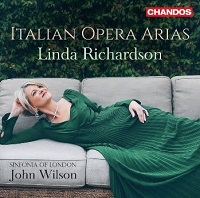 Italian Opera Arias
Italian Opera Arias
Giuseppe VERDI (1813–1901)
Pace, pace, mio Dio!
from ‘La forza del destino’ (1862) [5:49]
Ah, fors’è lui
and Sempre libera from ‘La traviata’ (1853) [6:46]
Giacomo PUCCINI (1858–1924)
D’onde lieta uscì
from ‘La Bohème’ (1896) [3:28]
Vissi d’arte
from ‘Tosca’ (1900) [3:25]
Gaetano DONIZETTI (1797–1848)
Piangete voi?
and Al dolce guidami from ‘Anna Bolena’ (1830) [9:33]
Giuseppe VERDI
Morrò, ma prima in grazia
from ‘Un ballo in maschera’ (1859) [4:53]
Caro nome
from ‘Rigoletto’ (1851) [6:39]
Addio, del passato
from ‘La traviata’ [6:35]
Vincenzo BELLINI (1801–1835)
Casta Diva
from ‘Norma’ (1831) [7:32]
Giacomo PUCCINI
Senza mamma
from ‘Suor Angelica’ (1918) [4:59]
Un bel dì, vedremo
from ‘Madama Butterfly’ (1904) [4:33]
Tu? Tu? Piccolo Iddio!
from ‘Madama Butterfly’ [5:02]
Linda Richardson (soprano)
Sinfonia of London/John Wilson
rec. Church of S. Augustine, Kilburn, London; 2–7 September 2019. DDD.
Texts and translations included
Reviewed as 24/44.1 press preview from
chandos.net
CHANDOS CHAN20155
[70:13] CD from
Amazon UK
-
Presto
Many years ago, I rescued a very old 78 record from my grandfather’s
collection. It contained music associated with Adelina Patti and began with
an announcement in a heavily accented voice that since the death of Patti
no-one had been able to match her range, so ‘Der solo vill be sang as a
kvartet’. I was never sure if it was a pre-Hoffnung joke, but it came to
mind in reviewing this collection of Italian Opera Arias. With such a wide
range of emotions, and with memories of Maria Callas, Victoria de los
Angeles and Joan Sutherland in mind in some of the pieces, there were
almost bound to be some reservations. In many ways Linda Richardson’s
stated attempt to cover a wide range of arias is the underlying problem.
Not everyone can sing everything, as an assistant in Henry Stave's
long-defunct record shop in Soho was once heard by a colleague of mine
explaining to an irate custromer why she couldn't have Jussi Björling sing
‘One fine day’, when she insisted that he sang everything.
Callas is far from my favourite singer, but there are always exceptions,
and her Casta diva is certainly one. If it’s Callas in Norma, Victoria de los Angeles remains unequalled in Puccini.
Though the Naxos Historical reissue of her 1957 Suor Angelica with
Tullio Serafin didn’t quite persuade me that it’s a top-rank opera, I
certainly enjoyed it very much –
review. There, again in Madam Butterfly, and even more in la Bohème,
she managed to achieve empathy with the character without
over-sentimentality. And for Anna Bolena, memories of Sutherland
are bound to surface, though with Richardson we can at least hear the
words.
That’s just three of the reasons why, though I enjoyed this recital, I
found myself thinking some of the items not quite in character. I even
wondered after the opening Pace, pace, mio Dio! if we weren’t in
for some squally vocal insecurity, but matters soon improved, and the three
Puccini items which end the programme contain some of the best singing. As
so often with Chandos, the recording sounds a little lacking in punch until
you turn up the volume.
***
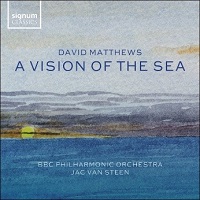 Both Chandos and Hyperion host downloads from other providers on their
websites. Space prevents a detailed examination here, but David MATTHEWS (b.1943) A Vision of the Sea, Symphony No.8, Toward Sunrise
and Sinfonia is especially worth mentioning among the
January 2021 releases (Signum SIGCD647 [67:42] – reviewed
in 24/96 sound with pdf booklet from
hyperion-records.co.uk). CD from
Amazon UK
-
Presto
Both Chandos and Hyperion host downloads from other providers on their
websites. Space prevents a detailed examination here, but David MATTHEWS (b.1943) A Vision of the Sea, Symphony No.8, Toward Sunrise
and Sinfonia is especially worth mentioning among the
January 2021 releases (Signum SIGCD647 [67:42] – reviewed
in 24/96 sound with pdf booklet from
hyperion-records.co.uk). CD from
Amazon UK
-
Presto
The performances by the BBC Philharmonic and Jac van Steen were recorded at
MediaCity Salford in November and December 2017. A lengthy speculative
correspondence on the MusicWeb Message Board reveals how much this
recording has been awaited, including confusion as to which label would be
releasing it. If you share my belief – heretical in some quarters – that
contemporary music should be more than crashes and bangs, yet not facile, this is one for
you. As I close this round-up, John Quinn's
review has been made a Recording of the Month.
Signum will also be bringing us Christopher GUNNING’s Symphonies Nos. 6 and 7 in March
2021 (SIGCD655), having already released his Symphonies
Nos. 2, 10 and 12 (SIGCD593 –
review), and his Violin Concerto and Cello Concerto (SIGCD621, originally
released by Discovery –
review), all available to download from
Hyperion.
Matthews’ music has been receiving more of its due recently. Nimbus have
recorded his Symphony No.91, Variations for Strings and Double Concerto for violin, viola and strings
(NI6382: Recording of the Month –
review
–
review). The performers are the English Symphony Orchestra1, Sara
Trickey (violin) Sarah-Jane Bradley (viola), English String Orchestra2 with Kenneth Woods conducting throughout.
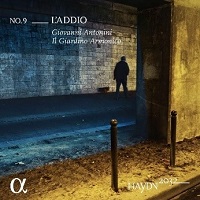 Chandos offer Alpha recordings. For January 2021 they have released the
latest volume of their HAYDN 2032 Project: Volume 9 –L’Addio includes Symphonies Nos. 15, 35 and 45 (The Farewell) and Scena di Berenice from Il Giardino Armonico and Giovanni Antonini
with Sandrine Piau (ALPHA684 CD from
Amazon UK
-
Presto). The latest volume in this series continues the familiar virtues and
minor reservations established by its predecessors. Like Volume 8, ‘La
Roxolana’ (ALPHA682), Giovanni Antonini conducts Il Giardino Armonico; on
some of the other volumes it’s Kammerorchester Basel. I liked that
recording, but wondered how appropriate was the inclusion of Bartók with
three Haydn symphonies –
review
– but PBW thought that it worked –
review.
Chandos offer Alpha recordings. For January 2021 they have released the
latest volume of their HAYDN 2032 Project: Volume 9 –L’Addio includes Symphonies Nos. 15, 35 and 45 (The Farewell) and Scena di Berenice from Il Giardino Armonico and Giovanni Antonini
with Sandrine Piau (ALPHA684 CD from
Amazon UK
-
Presto). The latest volume in this series continues the familiar virtues and
minor reservations established by its predecessors. Like Volume 8, ‘La
Roxolana’ (ALPHA682), Giovanni Antonini conducts Il Giardino Armonico; on
some of the other volumes it’s Kammerorchester Basel. I liked that
recording, but wondered how appropriate was the inclusion of Bartók with
three Haydn symphonies –
review
– but PBW thought that it worked –
review.
This time it’s all Haydn, with three symphonies and the Scena di Berenice and the theme is that of Farewell, which fits
No.45 very well, though it’s generally believed that No.35, scrupulously
dated on the score December 10, 1767, was composed to celebrate the
opposite – the return of Prince Esterházy from a trip to Versailles.
Competition is heavy, especially in the ‘Farewell’, with its typically
Haydn joke in the finale.
I have felt with some earlier volumes that Antonini was holding back some
of his ebullience. There’s little of that happening in No.45: in the
opening allegro assai, he may not be quite as fast as some of his
rivals, but he’s certainly furious, with moments of relaxation contrasting
with ebullience. The emotional power of the adagio slow movement
is fully recognised, and the allegretto minuet third movement is
taken at a sprightly pace, though never scrambled.
Alpha, like most recordings, divide the finale into presto and adagio sections. In the first there’s general agreement on a
lively pace, but Antonini and Pinnock (DG Archiv) start the adagio
at a pace closer to andante; in a concert performance, I’d be
afraid that the musicians might knock over their music stands as they
depart, but it works well on record, with the pace getting slower and
slower. In the other symphonies, too, the new recording stands up well
against the earlier competition.
I’ve stopped trying to work out the significance of the cover pictures, in
this case a shadowy figure on a wall of a man walking a dog. Some of the
photos which take up so much of the space in the booklet also seem only
marginally relevant to the ‘farewell’ theme. There are some very
informative notes about the ‘Farewell’ Symphony, and the aria, but the
space taken up by the pictures could have been used for more detailed
analysis of the other two symphonies, both dealt with rather briefly.
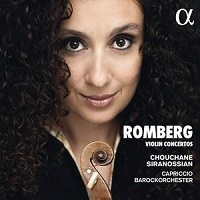 Mention of the name Romberg should not send operetta-haters running for
cover. This is Andreas ROMBERG (1767–1821) whose violin
concertos are receiving first recordings: Violin Concerto No.4 in C (1786)
[26:51], Violin Concerto No.12 in g minor (1800) [28:08] and Violin
Concerto No.9 in A (1795) [21:53] - Chouchane Siranossian (violin),
Capriccio Barockorchester, rec. April 2018, Radiostudio Zürich-Brunnenhof,
Switzerland. (ALPHA452 [76:50] CD from
Amazon UK
-
Presto). The recording has been released just two days after Siranossian won the
ICMA prize for her recording of the Tartini Violin Concertos (Alpha596 –
review
–
Spring 2020/1A). There she was accompanied by the Venice Baroque Orchestra and Andrea
Marcon. She also won an ICMA prize in 2019 for the Mendelssohn Violin
Concerto and Octet, with Anima Eterna Brugge and Jacob Lehman (Alpha410 –
review). Romberg’s music shares one aspect with that of his operetta namesake, in
that it’s fresh and tuneful, sounding almost like the violin concertos that
Mozart didn’t write, with later influences from Beethoven, and the
performances are also fresh and tuneful. I think this latest release may
also be destined for an award. My press preview came in very good 24/88.2
sound.
Mention of the name Romberg should not send operetta-haters running for
cover. This is Andreas ROMBERG (1767–1821) whose violin
concertos are receiving first recordings: Violin Concerto No.4 in C (1786)
[26:51], Violin Concerto No.12 in g minor (1800) [28:08] and Violin
Concerto No.9 in A (1795) [21:53] - Chouchane Siranossian (violin),
Capriccio Barockorchester, rec. April 2018, Radiostudio Zürich-Brunnenhof,
Switzerland. (ALPHA452 [76:50] CD from
Amazon UK
-
Presto). The recording has been released just two days after Siranossian won the
ICMA prize for her recording of the Tartini Violin Concertos (Alpha596 –
review
–
Spring 2020/1A). There she was accompanied by the Venice Baroque Orchestra and Andrea
Marcon. She also won an ICMA prize in 2019 for the Mendelssohn Violin
Concerto and Octet, with Anima Eterna Brugge and Jacob Lehman (Alpha410 –
review). Romberg’s music shares one aspect with that of his operetta namesake, in
that it’s fresh and tuneful, sounding almost like the violin concertos that
Mozart didn’t write, with later influences from Beethoven, and the
performances are also fresh and tuneful. I think this latest release may
also be destined for an award. My press preview came in very good 24/88.2
sound.
There are plenty of recordings of Purcell’s music about love – pleasant and
painful. The latest is entitled Tyrannic Love:
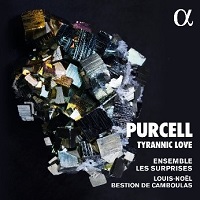 Henry PURCELL (1659-1695)
Henry PURCELL (1659-1695)
King Arthur, Z628: Hornpipe (Second Act Tune) [1:15]
John ECCLES (1668-1735)
The Comical History of Don Quixote, Part II: ‘I burn, my brain consumes to ashes’ [3:20]
John BLOW (1649-1708)
‘Poor Celadon, he sighs in vain’ (Loving above himself) [4:40]
Henry PURCELL
The Prophetess, or The History of Dioclesian,
Z627: Dance of the Furies [3:11]
Rule a Wife and have a Wife, Z587: ‘There’s not a swain on the plain’
[1:24]
The Fairy Queen, Z629: Hornpipe [0’52]; Dance for the Fairies [0:52]; Dance for the Green
Men [1:28]
The Indian Queen, Z630: ‘Ye twice ten hundred Deities’ [4:23]; Symphony [1:16]; ‘Seek not
to know’ [2:41]
John BLOW
Venus And Adonis: Saraband for the graces [1:27]
Henry PURCELL
A Fool’s Preferment, or The Three Dukes of Dunstable, Z571: ‘There’s nothing so fatal as women’ [1:03]
The Virtuous Wife, Z611: Overture [2:37]
John ECCLES
The Comical History of Don Quixote, Part I: ‘Sleep, poor youth’ (The Dirge) [7:15]
Henry PURCELL
The Virtuous Wife, Z611: Slow Air [2:16]; Air [0:34]
The Yorkshire Feast Song, Z333: ‘So when the glitt’ring Queen of Night’ [3:47]; ‘This poet sings
the Trojan wars’ (Anacreon’s defeat, Z423) [3:46]
Jeremiah CLARKE (c.1674-1707)
Song on The Assumption: Ground in d minor [2:17]
Daniel PURCELL (c.1664-1717)
Pausanias, The Betrayer of His Country, Z585: ‘My dearest, my fairest’ [2:35]
Henry PURCELL
Tyrannic Love, or The Royal Martyr, Z613: ‘Hark! My Damilcar’ [4:23]
King Arthur, Z628: Chaconne [3:13]
Eugénie Lefebvre (soprano), Étienne Bazola (baritone)
Ensemble Les Surprises/Louis-Noël Bestion de Camboulas (harpsichord, organ)
rec. February 2020, Ferme de Villefavard, France. DDD.
Texts and translations included.
Reviewed as 24/96 press preview.
ALPHA663
[60:45] CD from
Amazon UK
-
Presto
The title is really a handle on which to hang a pleasant recital of theatre
music by Purcell and distinguished contemporaries, John Eccles, John Blow,
Jeremiah Clarke – the real composer of what for years was called the
‘Purcell Voluntary’ – and younger brother Daniel Purcell. The programme
ranges over a gamut of emotions, and does so with gusto – and without,
where appropriate – yet never losing a sense of style.
It’s quite appropriate that the performers should have made their
reputation in the French repertoire; at no time was English more influenced
by the French style than at the Restoration. Both singers pronounce English
idiomatically, and without too much of the tendency that has developed for
Mummerset pronunciation. As so often with recent Alpha releases, the
significance of the cover eludes me.
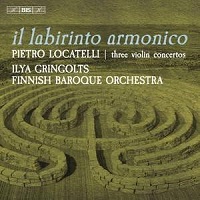 BIS downloads, though available from Chandos, are best obtained from their
own site eclassical.com. My pick
of the month here is an album of the music of LOCATELLI: Il Labirinto armonico, including the
violin concerto with that name, Op.3/12, and two of its companions from the
Finnish Baroque Orchestra and Ilya Gringolts (BIS-2445 SACD SACD from
Amazon UK
-
Presto). The main work, a capriccio with virtuoso solo parts, alludes to the
perilous journey of Aeneas and the Sibyl to the Underworld in Book VI of
the Aeneid. The work’s motto ‘Facilis aditus, difficilis exitus’
(it’s easy to get in, hard to get out) even (loosely) quotes Vergil’s words: Facilis descensus Averno … Locatelli may briefly have been a pupil
of Corelli; certainly, he took the Corelli style with him all over Europe,
finally settling in Amsterdam. My only reservation about this BIS release
is that it may tempt you to obtain Locatelli’s complete Op.3 set, L’Arte del violino, in the recording by Elizabeth Wallfisch and
Raglan Baroque with Nicholas Kraemer (Hyperion CDS33491/3, 3 CDs, or
download: both available inexpensively from
hyperion-records.co.uk).
BIS downloads, though available from Chandos, are best obtained from their
own site eclassical.com. My pick
of the month here is an album of the music of LOCATELLI: Il Labirinto armonico, including the
violin concerto with that name, Op.3/12, and two of its companions from the
Finnish Baroque Orchestra and Ilya Gringolts (BIS-2445 SACD SACD from
Amazon UK
-
Presto). The main work, a capriccio with virtuoso solo parts, alludes to the
perilous journey of Aeneas and the Sibyl to the Underworld in Book VI of
the Aeneid. The work’s motto ‘Facilis aditus, difficilis exitus’
(it’s easy to get in, hard to get out) even (loosely) quotes Vergil’s words: Facilis descensus Averno … Locatelli may briefly have been a pupil
of Corelli; certainly, he took the Corelli style with him all over Europe,
finally settling in Amsterdam. My only reservation about this BIS release
is that it may tempt you to obtain Locatelli’s complete Op.3 set, L’Arte del violino, in the recording by Elizabeth Wallfisch and
Raglan Baroque with Nicholas Kraemer (Hyperion CDS33491/3, 3 CDs, or
download: both available inexpensively from
hyperion-records.co.uk).
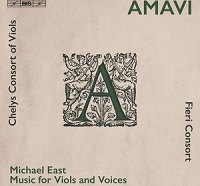 Another new release from BIS brings a collection of music for viols and
voices by Michael EAST (1580-1648) performed by the singers
of the Fieri Consort and the Chelys Consort of Viols, rounded off with a
contemporary setting of a C17 text ‘Now are my thoughts at peace’ (Jill JARMAN, b.1959). (BIS-2503 SACD
[71:14] SACD from
Presto,
16- or 24-bit download from
eclassical.com). The 24-bit (stereo and surround) comes at 192KHz, so it’s a very large
file (2.34 GB).
Another new release from BIS brings a collection of music for viols and
voices by Michael EAST (1580-1648) performed by the singers
of the Fieri Consort and the Chelys Consort of Viols, rounded off with a
contemporary setting of a C17 text ‘Now are my thoughts at peace’ (Jill JARMAN, b.1959). (BIS-2503 SACD
[71:14] SACD from
Presto,
16- or 24-bit download from
eclassical.com). The 24-bit (stereo and surround) comes at 192KHz, so it’s a very large
file (2.34 GB).
The vocal items (verse anthems and madrigals) are interspersed with a set
of viol pieces, each given a Latin title, rather in the manner of Dowland’s Lachrymæ: from Peccavi (I have sinned) to Amavi
(I have loved). East’s music deserves to be better known and more often
recorded; though it appears in collections, such as recordings of The Triumphs of Oriana, to which he was one of many contributors,
this appears to be the only album devoted (almost) entirely to him.











